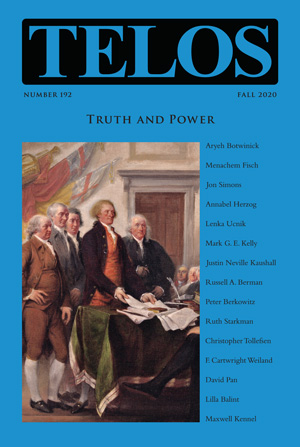By Jon Simons · Friday, October 16, 2020 Jon Simons’s “Divine Violence, Profane Peace: Walter Benjamin, Rabbis for Human Rights, and Peace in Israel–Palestine” appears in Telos 192 (Fall 2020): Truth and Power. Read the full article at the Telos Online website, or purchase a print copy of the issue in our online store. Individual subscriptions to Telos are available in both print and online formats.
 One of the reasons for disaffection toward peace among Jewish Israelis may be a “Judaic deficit” in the secular, liberal conceptions of peace implicit in both official peace processes and peace activism. I address this deficit by bringing the Judaically inflected but nonreligious work of Walter Benjamin into conversation with the thought and practice of Rabbis for Human Rights, who combine Judaism with liberal, universal rights. Benjamin’s essay “Critique of Violence” counters the legally enforced violence of liberal peace with a conjugation of divine violence and nonviolent conflict resolution. Interpreting his essay with particular attention to his reading of the Biblical story of Korah leads to a theologico-political notion of peace as agonistic, human wrestling with divine violence and power. Rabbis for Human Rights embody such peace to some degree in their simultaneous interpretation of divine law and “small acts” of nonviolent opposition to Occupation. One of the reasons for disaffection toward peace among Jewish Israelis may be a “Judaic deficit” in the secular, liberal conceptions of peace implicit in both official peace processes and peace activism. I address this deficit by bringing the Judaically inflected but nonreligious work of Walter Benjamin into conversation with the thought and practice of Rabbis for Human Rights, who combine Judaism with liberal, universal rights. Benjamin’s essay “Critique of Violence” counters the legally enforced violence of liberal peace with a conjugation of divine violence and nonviolent conflict resolution. Interpreting his essay with particular attention to his reading of the Biblical story of Korah leads to a theologico-political notion of peace as agonistic, human wrestling with divine violence and power. Rabbis for Human Rights embody such peace to some degree in their simultaneous interpretation of divine law and “small acts” of nonviolent opposition to Occupation.
Continue reading →
By Telos Press · Thursday, October 27, 2016 “The human receives a particular historical consciousness from his ‘space,’ which is subjected to great historical transformations. The variegated forms of life correspond to equally differentiated spaces. Even within the same time period, the environment of individual humans for the practice of daily life is already defined differently by their different life occupations. An urbanite thinks the world otherwise than does a peasant farmer, a whale-fish hunter has another living space than an opera singer, and to a pilot the world and life appear otherwise not only in other lights but also in other quantities, depths, and horizons.”
—Carl Schmitt, Land and Sea: A World-Historical Meditation
Continue reading →
By Telos Press · Thursday, September 1, 2016 “The human receives a particular historical consciousness from his ‘space,’ which is subjected to great historical transformations. The variegated forms of life correspond to equally differentiated spaces. Even within the same time period, the environment of individual humans for the practice of daily life is already defined differently by their different life occupations. An urbanite thinks the world otherwise than does a peasant farmer, a whale-fish hunter has another living space than an opera singer, and to a pilot the world and life appear otherwise not only in other lights but also in other quantities, depths, and horizons.”
—Carl Schmitt, Land and Sea: A World-Historical Meditation
Continue reading →
|
|
 One of the reasons for disaffection toward peace among Jewish Israelis may be a “Judaic deficit” in the secular, liberal conceptions of peace implicit in both official peace processes and peace activism. I address this deficit by bringing the Judaically inflected but nonreligious work of Walter Benjamin into conversation with the thought and practice of Rabbis for Human Rights, who combine Judaism with liberal, universal rights. Benjamin’s essay “Critique of Violence” counters the legally enforced violence of liberal peace with a conjugation of divine violence and nonviolent conflict resolution. Interpreting his essay with particular attention to his reading of the Biblical story of Korah leads to a theologico-political notion of peace as agonistic, human wrestling with divine violence and power. Rabbis for Human Rights embody such peace to some degree in their simultaneous interpretation of divine law and “small acts” of nonviolent opposition to Occupation.
One of the reasons for disaffection toward peace among Jewish Israelis may be a “Judaic deficit” in the secular, liberal conceptions of peace implicit in both official peace processes and peace activism. I address this deficit by bringing the Judaically inflected but nonreligious work of Walter Benjamin into conversation with the thought and practice of Rabbis for Human Rights, who combine Judaism with liberal, universal rights. Benjamin’s essay “Critique of Violence” counters the legally enforced violence of liberal peace with a conjugation of divine violence and nonviolent conflict resolution. Interpreting his essay with particular attention to his reading of the Biblical story of Korah leads to a theologico-political notion of peace as agonistic, human wrestling with divine violence and power. Rabbis for Human Rights embody such peace to some degree in their simultaneous interpretation of divine law and “small acts” of nonviolent opposition to Occupation. 

